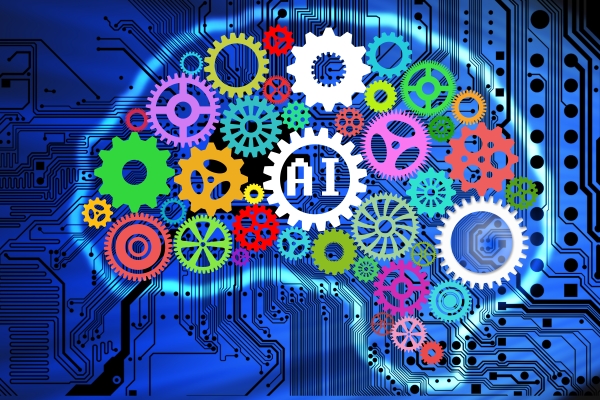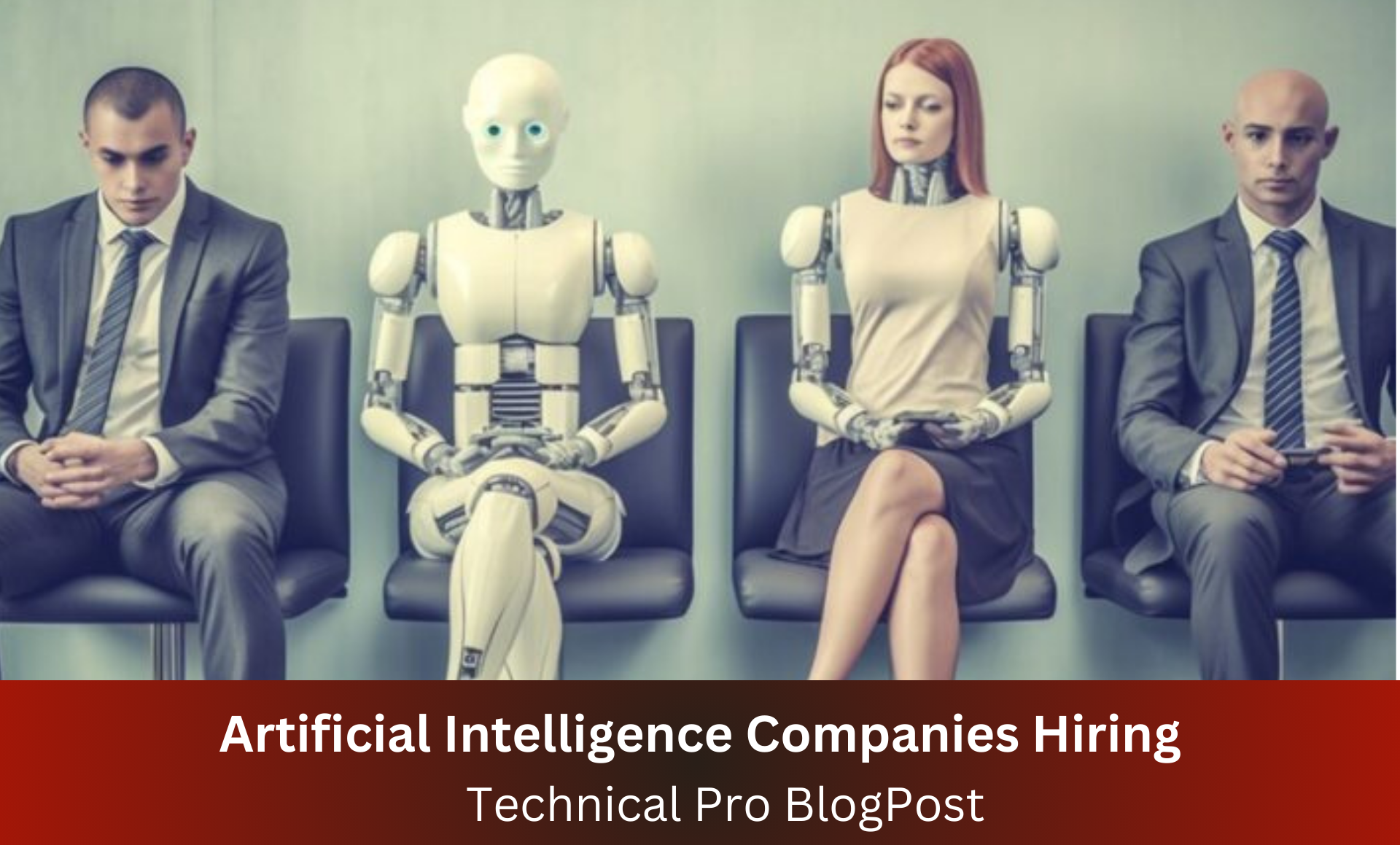The Booming Landscape of AI Job Opportunities
The Artificial Intelligence Companies Hiring has witnessed explosive growth in recent years, transforming various sectors from healthcare to finance. As a result, the demand for skilled AI professionals has surged, making it an opportune time for job seekers to explore career opportunities in this dynamic field. In this comprehensive guide, we delve into the top AI companies currently hiring, the types of roles available, and the skills required to excel in the AI domain.
Top Artificial Intelligence Companies Hiring
1. Google AI and DeepMind
Google has been a frontrunner in AI research and development through its dedicated AI division and its acquisition of DeepMind. Google AI focuses on machine learning, natural language processing, and computer vision. DeepMind, known for its groundbreaking work in reinforcement learning and AlphaGo, offers roles ranging from research scientists to AI engineers.
2. OpenAI
OpenAI, a leading AI research organization, aims to ensure that artificial general intelligence benefits all of humanity. OpenAI is known for its advancements in generative models like GPT-3. The company offers positions for AI researchers, engineers, and policy experts, emphasizing collaboration and innovation.
3. IBM Watson
IBM Watson specializes in Artificial Intelligence Companies solutions for businesses, focusing on natural language processing, machine learning, and data analytics. IBM is continually expanding its AI team, seeking professionals with expertise in developing and deploying AI-driven business solutions.
4. Amazon Web Services (AWS)
AWS, Amazon’s cloud computing arm, provides AI and machine learning services such as SageMaker. AWS is hiring for roles that include AI/ML engineers, data scientists, and solutions architects, focusing on building scalable AI applications for a wide range of industries.
5. Microsoft Artificial Intelligence Companies
Microsoft has integrated AI across its products and services, from Azure AI to Cortana. The company offers roles for AI researchers, engineers, and product managers, working on innovative projects that leverage AI to enhance productivity and user experience.
In-Demand AI Job Roles

1. AI Research Scientist
AI research scientists focus on developing new algorithms and models to advance the field of artificial intelligence. They typically hold advanced degrees in computer science or related fields and have strong backgrounds in mathematics, statistics, and programming.
2. Machine Learning Engineer
Machine learning engineers build and deploy machine learning models. They need expertise in programming languages such as Python or R, and experience with ML frameworks like TensorFlow or PyTorch. Their role involves preprocessing data, training models, and optimizing performance.
3. Data Scientist
Data scientists analyze and interpret complex data to help organizations make data-driven decisions. They must be skilled in statistical analysis, data visualization, and machine learning, and proficient in tools like SQL, Tableau, and Hadoop.
4. AI Product Manager
AI product managers bridge the gap between technical teams and business stakeholders. They define product requirements, develop strategies, and ensure that Artificial Intelligence Companies projects align with business goals. Strong communication skills and a solid understanding of AI technologies are crucial for this role.
5. AI Ethicist
AI ethicists address the ethical implications of AI technologies. They work on developing guidelines and policies to ensure that AI is used responsibly and ethically. This role requires a deep understanding of both AI and ethical frameworks, often necessitating interdisciplinary knowledge.
Essential Skills for AI Professionals

1. Programming Languages
Proficiency in programming languages like Python, Java, and C++ is essential for AI professionals. Python, in particular, is widely used due to its simplicity and extensive libraries for Artificial Intelligence Companies and machine learning.
2. Mathematics and Statistics
A strong foundation in mathematics and statistics is crucial for understanding and developing AI algorithms. Key areas include linear algebra, calculus, probability, and statistical analysis.
3. Machine Learning Frameworks
Familiarity with machine learning frameworks such as TensorFlow, Keras, and PyTorch is important for implementing and experimenting with machine learning models.
4. Data Handling and Processing
Skills in data handling and processing are vital, as AI models rely on large datasets. Knowledge of databases, data cleaning techniques, and tools like Pandas and NumPy is necessary.
5. Cloud Computing
Understanding cloud platforms like AWS, Google Cloud, and Microsoft Azure is beneficial, as many AI applications are deployed on the cloud. Cloud computing skills enable scalability and efficient resource management.
How to Get Hired by Top Artificial Intelligence Companies

1. Build a Strong Educational Background
Most AI roles require at least a bachelor’s degree in computer science, data science, or a related field. Advanced degrees (master’s or Ph.D.) can provide a competitive edge, especially for research positions.
2. Gain Practical Experience
Hands-on experience through internships, projects, and open-source contributions is invaluable. Participating in AI competitions on platforms like Kaggle can also showcase your skills to potential employers.
3. Develop a Robust Portfolio
A well-curated portfolio demonstrating your AI projects, research, and practical applications can significantly enhance your job prospects. Include detailed descriptions, code samples, and results of your projects.
4. Network and Engage with the AI Community
Networking is crucial for career advancement. Attend AI conferences, join online forums, and engage with the AI community on platforms like LinkedIn and GitHub to stay updated and connected.
5. Prepare for Technical Interviews
AI job interviews often include technical assessments. Prepare by practicing coding problems, understanding AI concepts, and reviewing case studies. Familiarize yourself with common interview questions and problem-solving techniques.
The Growing Demand for Artificial Intelligence Companies Talent

Overview of AI Market Growth
The AI market is experiencing exponential growth, with projections indicating it will reach a market size of over $190 billion by 2025. This growth is fueled by advancements in machine learning, natural language processing, and data analytics.
Importance of AI in Various Sectors
AI’s impact spans multiple industries, including healthcare, finance, retail, and manufacturing. Its applications range from predictive analytics and automation to personalized customer experiences and advanced robotics.
Top AI Companies Hiring in 2024

Google Artificial Intelligence Companies
Google AI is at the forefront of AI research and development. The company is known for its work in machine learning, natural language processing, and computer vision.
Job Opportunities
- Machine Learning Engineers
- Data Scientists
- AI Researchers
Key Projects
- TensorFlow
- Google Assistant
- Waymo (self-driving cars)
Microsoft AI
Microsoft AI focuses on integrating Artificial Intelligence Companies into its products and services, including Azure AI, Office 365, and LinkedIn.
Job Opportunities
- AI Product Managers
- Data Scientists
- Software Engineers
Key Projects
- Azure AI
- Cortana
- Project Bonsai
IBM Watson
IBM Watson is renowned for its Artificial Intelligence Companies capabilities in healthcare, finance, and customer service.
Job Opportunities
- AI Researchers
- Machine Learning Engineers
- Business Analysts
Key Projects
- Watson Health
- Watson Assistant
- Project Debater
Amazon AI
Amazon AI drives innovation through its cloud-based AI services and consumer-facing products like Alexa.
Job Opportunities
- Robotics Engineers
- Data Scientists
- Machine Learning Engineers
Key Projects
- AWS AI Services
- Amazon Go
- Alexa
Facebook AI Research (FAIR)
FAIR focuses on advancing the field of AI through research and development in areas like deep learning and computer vision.
Job Opportunities
- AI Researchers
- Software Engineers
- Data Scientists
Key Projects
- PyTorch
- DeepFace
- M Suggestions
NVIDIA
NVIDIA is a leader in AI hardware and software, particularly known for its GPUs used in AI training and inference.
Job Opportunities
- Machine Learning Engineers
- AI Researchers
- Software Developers
Key Projects
- CUDA
- Jetson
- DRIVE (autonomous vehicles)
Skills Required for AI Jobs

Technical Skills
- Proficiency in programming languages (Python, R, Java)
- Knowledge of machine learning frameworks (TensorFlow, PyTorch)
- Understanding of data structures and algorithms
Soft Skills
- Problem-solving abilities
- Communication skills
- Team collaboration
Educational Background
- Degrees in computer science, mathematics, statistics, or related fields
- Advanced degrees (Master’s, PhD) are often preferred for research roles
How to Prepare for a Career in AI

Educational Programs
- Online courses (Coursera, edX, Udacity)
- University degrees and certifications
Practical Experience
- Internships and co-op programs
- Personal projects and contributions to open-source projects
Networking and Professional Development
- Attending AI conferences and workshops
- Joining AI-related professional groups and forums
Conclusion
The artificial intelligence industry offers a plethora of opportunities for professionals with the right skills and knowledge. By targeting top AI companies, understanding the in-demand roles, and continuously developing relevant skills, you can position yourself for a successful career in AI. Whether you are a seasoned professional or just starting, the AI field promises a dynamic and rewarding career path.
FAQs
1. What is the average salary for AI professionals?
AI professionals can expect competitive salaries, with roles like machine learning engineers and data scientists earning upwards of $100,000 annually.
2. What companies are leading in AI innovation?
Leading companies include Google, Microsoft, IBM, Amazon, Facebook, and NVIDIA.
3. How can I transition into an AI career from a different field?
Transitioning into AI can be achieved through continued education, practical experience, and networking within the industry.
4. What are the future prospects for AI careers?
The future for AI careers is promising, with increasing demand across various sectors and continuous advancements in technology.
